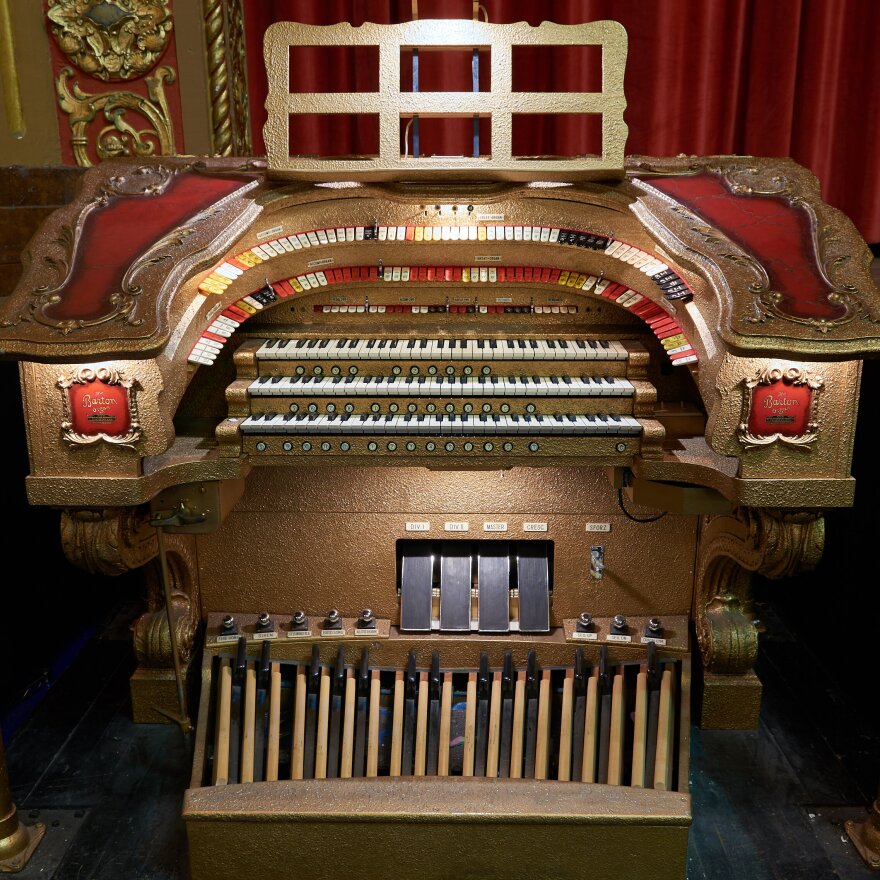Creative industries in Washtenaw County add hundreds of millions of dollars to the local economy. In the weeks and months to come, host Deb Polich, the President and CEO of Creative Washtenaw, explores the myriad of contributors that make up the creative sector in Washtenaw County.

ABOUT STEPHEN WARNER:

In addition to the Michigan, Stephen Warner is the organist at Jefferson Avenue Presbyterian Church (Detroit), where he created a fully illustrated book describing the function and design of their Skinner Organ. For this project, he received the support of the Organ Historical Society through the awarding of the Mader Memorial Research Scholarship.
In 2003, he completed dual bachelor’s degrees in organ performance and in mechanical engineering at U of M, where he had the opportunity to play the organ with many of the bands, orchestras and choirs, including the U of M Men’s Glee Club. He studied organ primarily with Dr. James Kibbie and piano with Dr. Nouis Nagel, and was drawn to engineering primarily due to his interest in organ building. He worked as an intern for John Brombaugh and Associates in Eugene, Oregon and, now, is an assistant for the Holden Pipe Organ Company in Ferndale. He was awarded the David L. Junchen Technical Scholarship from the American Theater Organ Society.
Warner enjoys collaborating with his wife, Rose, a singer and with his long-time friend and saxophonist, Adam Olson, in recording and performing the works of vaudeville virtuoso, Rudy Wiedoeft. His performance focus has, also, turned to accompanying silent films.
RESOURCES:
Michigan Theater Organists (Stephen Warner bio included)
Nosferatu Screening at The Michigan Theater
TRANSCRIPTION:
Deb Polich: This is 89 one WEMU, and it's time for creative:impact, WEMU's exclusive, award-winning show featuring the artists, creative people, businesses and organizations impacting Washtenaw County's quality of life, place and economy. I'm Deb Polich, president and CEO of Creative Washtenaw and your guest. So, Stephen Warner is an organist of sanctuaries and screens. Whether it's a cathedral of worship, like the Jefferson Avenue Presbyterian Church in Detroit, or a movie palace like the Michigan Theater in Ann Arbor, the pipe organ is his instrument. We're here to talk with Stephen. And, Stephen, thanks so much for being here.
Stephen Warner: Thank you so much for having me, Deb.
Deb Polich: So, you know, I was having a conversation with my granddaughter recently, and she's soon to be in the fifth grade. And she was talking about what instrument she was going to choose to play. And we discussed the fact that it might be a good idea to pick an instrument that she could carry back and forth to school. A pipe organ doesn't fit that criteria. How did you find yourself playing at a console on a big, huge instrument like the pipe organ?
Stephen Warner: Well, for many of us, it's a key early exposure. For me, I had a couple little exposures. My grandparents were involved at the University of Michigan School of Music, and there was a dedication recital of a new organ in Burdickville, which is near the Sleeping Bear Dunes--I lived up in Traverse City. And I saw a recital there with someone who later became one of my teachers and my uncle playing flute, dedicating this little pipe organ when I was probably between four and five years old. And then, the second exposure really was a family trip to Grand Rapids. And we went to the what was called the Roaring Twenties Pizza Parlor, which had a theater organ from an old theater played live for the diners. And I was completely captivated and said, "I want to do that!"
Deb Polich: Did you start as a keyboardist and then you moved into that, or was organ number one?
Stephen Warner: We chose to start with piano because it was the most practical thing. But we found a piano teacher that also taught organ. I didn't actually start really playing the organ seriously until I was 13. So, we just stuck with piano, but we always listened to the organ as much as we could. There weren't a lot of instruments up in Traverse City, but enough. And we had Interlochen nearby, so we always went out and caught recitals out there as they occurred.
Deb Polich: And I believe I understand that the study of organ is often more classically-based. You found yourself and moved into theater organ. How did that transition take place?

Stephen Warner: Well, I always wanted to do theater organ, but there weren't any to be had in my hometown when I was growing up. There is an instrument up there now at the Music House Museum.
Deb Polich: So, the pipe organ, an instrument in a church or a cathedral versus a theater organ. They're different instruments?

Stephen Warner: Very, very different. I mean, they're both essentially pipe organs, but the way a theater organ is set up and laid out and mechanically disposed is quite different and providing a lot of different opportunities for how the organist uses it. It is actually derived from an invention by Robert Hope Jones, who was an English electrical engineer, who came over to the States. And his inventions were kind of absorbed by the industry at that perfect moment when suddenly we needed instruments in movie theaters accompanying films because the theaters were getting bigger. And the piano was not big enough to fill a room. And hiring an orchestra wasn't an option for every movie house. So, the pipe organ fit the bill, and the pipe organ industry grew and filled that particular market void for almost 20 years.
Deb Polich: And so, as you said, the organ filled the room. We had silent movies, but the music always was part of the experience. And an organ took that role and was able to play a myriad of different sounds to accompany the work. Is that a rather accurate depiction?
Stephen Warner: Yes, indeed. So, the theater organ has its physical differences with a regular church organ that the instrument has each of the set of pipes in the instrument is accessible independently. So, for example, the Barton organ I'll be playing at the Michigan Theater has 13 sets of pipes, which, on a church organ, isn't all that large, but, on that instrument, they are disposed of in a way that it actually derives almost 130 stops the different combinations of sounds. It also has actual percussions that are played by air pressure. And so, you have xylophones and glockenspiels and marimbas. And then, you also have sound effects that you would use for Foley in the silent film as well.

Deb Polich: So, my first experience with the theater organ was "The Thief of Baghdad," and I was always thought silent film was kind of campy and, you know, all that. But 5 minutes in, if the music had stopped, I would have been completely lost. Do you recall your very first experience with a silent film and orchestra or music?
Stephen Warner: I think, actually, my first silent film live was at the Michigan Theater my freshman year, and Jim Leaf was accompanying the film at that time.
Deb Polich: Do you recall the film?
Stephen Warner: It was "Nosferatu!"
Deb Polich: Well, we're going to get to that in just a second. 89 one WEMU's creative:impact continues. Stephen Warner, theater organist of stars and screen, is my guest. So, you mentioned "Nosferatu." I'm so glad we're here and doing this right now because it is almost Halloween. And for years now--in fact, so many years, it's become a tradition--the Michigan theater shows this 1922 film classic "Nosferatu," and it's recognized widely as the firs,t and perhaps the best, and in my opinion, the creepiest vampire movie ever. You're going to be seated at the console at the 1928 Barton Organ playing the music for this film, which now I know is the first silent film you ever saw with an accompaniment. So, how cool is that?
Stephen Warner: Oh, it's great fun. This is actually probably my 18th performance of this film, which, for veterans, is not a lot. But for me, it's one of the few artistic creations that I have that's actually been scaled somewhat.
Deb Polich: So, 18 times! So, are you playing a score or do you make it up? Is it impromptu every time?
Stephen Warner: What I am doing is performing a compiled score. So, I have selected existing material and applied it to different scenes and action of the film. And, in this case, for "Nosferatu," most of the source music is actually by Edvard Grieg, and the bulk of it is actually from his piano sonata, which isn't a very well-known piece. The advantage to that is that it kind of creates a natural cohesion having all of this music, mostly from the same composer. But also, Grieg was used a lot in silent film in compliment. If you purchased silent film music collections, which actually were published in the teens and twenties, Grieg was used a lot because it's very, very depictive. It's a lot of character pieces, so it's very useful to apply to drama and action and emotive scenes.
Deb Polich: So, you're working with that source material. But does modern-day music--does anything--come into it that brings it to today for the audiences listening? Or do you stick to pretty much tradition?
Stephen Warner: I think, in this case, this particular score is pretty much traditional. And, you know, what is relevant for today in terms of musical content, if you listen to any current score being written for a Netflix show, particularly something more traditional, like a Star Wars show or something--I guess that'd be Disney Plus,--you know, those scores are all very, I guess, what you'd say, tonally traditional. So, you know, the music is very tonally traditional in this case. You know, of course, it's reflecting my emotional reaction to the film. And what I hope is honors the intent of the filmmaker.
Deb Polich: So, I'm thinking of sounds of chords and things like that. Anything you can describe or even maybe play for us in a minute?
Stephen Warner: For example, the main theme, which is quite creepy, is actually the main theme of the piano sonata, which goes kind of like this.
Deb Polich: Well, that's pretty cool. Well, we can't wait to see it this weekend at the Michigan Theater and hear it at the Michigan Theater. Stephen, thank you so much for being with us today. And I'm certain that you're going to be thrilling the audiences. Thanks for being on our show.
Stephen Warner: Thank you.
Deb Polich: Thank you. That's pipe organist Stephen Warner. He's playing the organ accompaniment for the Halloween classic "Nosferatu" at the Michigan Theater this year. Find out more about Stephen or "Nosferatu" at WEMU dot org. You've been listening to creative:impact. I'm Deb Polich, your host, and Mat Hopson is our producer. We invite you to join us every Tuesday to meet the people who make Washtenaw creative. This is 89 one WEMU FM Ypsilanti. Public radio from Eastern Michigan University.

Non-commercial, fact based reporting is made possible by your financial support. Make your donation to WEMU today to keep your community NPR station thriving.
Like 89.1 WEMU on Facebook and follow us on Twitter
Contact WEMU News at 734.487.3363 or email us at studio@wemu.org







